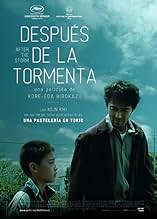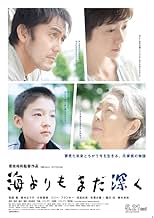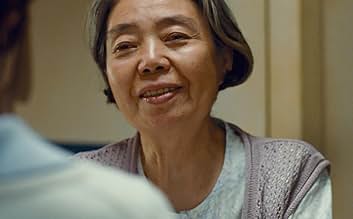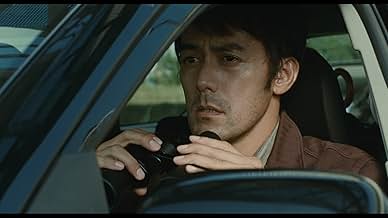VALUTAZIONE IMDb
7,4/10
13.743
LA TUA VALUTAZIONE
Dopo la morte di suo padre, un detective privato lotta per trovare sussidi di sostegno per l'infanzia e ricongiungersi col figlio e la ex moglie.Dopo la morte di suo padre, un detective privato lotta per trovare sussidi di sostegno per l'infanzia e ricongiungersi col figlio e la ex moglie.Dopo la morte di suo padre, un detective privato lotta per trovare sussidi di sostegno per l'infanzia e ricongiungersi col figlio e la ex moglie.
- Premi
- 2 vittorie e 13 candidature totali
Recensioni in evidenza
There are not many directors whose films I greet with enthusiasm, let alone Japanese ones. I think Hirokazu Koreeda is the only one. His films are a different breed - simple in design, but brilliant in architecture and sublime in closure.
Koreeda is the leading exponent in contemplative cinema. Under his minimalist approach, the essence of familial life and couplehood is distilled into abstract thoughts lingering like warm tendrils wrapped around your mind. The movie may be over but it refuses leave the confines of your consciousness and you would want to surrender to its warm lull again. The tone of After the Storm is pitch-perfect - nobody screams in your face, there are no pointing fingers, no low brow soap-opera. The acting is exquisite and nuanced. What is not said speaks louder than what is uttered. There is humour of the familiar kind; it is the kind of humour you laughed heartily because it is so familiar and you recognise the situations because you have gone through them before. There are not many filmmakers who are as sensitive as Koreeda. Above all else, this is a director who listens to characters' inner thoughts and emotions like an old master piano tuner and he knows how to calibrate the performances for everlasting emotional heft. For Koreeda, it is always about the small moments leading to the big truths.
After the Storm is not one of Koreeda's best films (it needlessly took too long to establish Ryota's character) but it easily transcends way above all the flashy films that inundate our cinemas like ants to candies. I wish I had a notebook last night because some of the metaphors are amazing. Here is one, asseverated by the grandmother Yoshiko, "The longer a stew sits, the more flavour it develops, just like people."
Koreeda is the leading exponent in contemplative cinema. Under his minimalist approach, the essence of familial life and couplehood is distilled into abstract thoughts lingering like warm tendrils wrapped around your mind. The movie may be over but it refuses leave the confines of your consciousness and you would want to surrender to its warm lull again. The tone of After the Storm is pitch-perfect - nobody screams in your face, there are no pointing fingers, no low brow soap-opera. The acting is exquisite and nuanced. What is not said speaks louder than what is uttered. There is humour of the familiar kind; it is the kind of humour you laughed heartily because it is so familiar and you recognise the situations because you have gone through them before. There are not many filmmakers who are as sensitive as Koreeda. Above all else, this is a director who listens to characters' inner thoughts and emotions like an old master piano tuner and he knows how to calibrate the performances for everlasting emotional heft. For Koreeda, it is always about the small moments leading to the big truths.
After the Storm is not one of Koreeda's best films (it needlessly took too long to establish Ryota's character) but it easily transcends way above all the flashy films that inundate our cinemas like ants to candies. I wish I had a notebook last night because some of the metaphors are amazing. Here is one, asseverated by the grandmother Yoshiko, "The longer a stew sits, the more flavour it develops, just like people."
Remarkable consistency in delivering great dramas. If you are a drama film fan without the language barrier, then you must have seen at least a couple of films of Hirokazu Koreeda. Less than a year ago I saw his new arrival 'Our Little Sister'. Despite not overwhelmingly impressed with that, I won't say that I did not enjoy it. I always fascinated with the realistic portrayal, but the points should be executed so well than leaving empty scenes and dialogues, and calling it an art film. This one was much better. The first impression was okay, but after giving some time between my watch and writing this review, I kind of started to like it more.
First of all, this story was not new for me. I have already seen a few similar themed films from other parts of the world, particularly in Hollywood. But none of them were as serious as this one while narrating its tale. The storyline was simple, entirely focused on a family, fighting on stumbling marriage. It was a long introduction, particularly aimed at a father, like how he messed up in his life with gambling. But opening few minutes made him look like a man of example. Only in the following event you would know how deep his troubles are.
Other than his family, his work field was introduced to us. Being a writer, but for a few quick bucks working as a private eye on his part time, he misuses the opportunity with his loyal friend. Once the film reaches the half way mark, the focus shifts back to the family where the remaining story takes place. It was a stormy day and they all gather in his mother's apartment. This is where everything will be cleared out, whether the marriage will be saved or not. But the mother's one final push as it seems planned perfectly, would it deliver a result is what you should watch it to learn.
❝I wonder why it is that men can't love the present. Either they just keep chasing whatever it is they've lost, or they keep dreaming beyond their reach.❞
You can't doubt Hiroshi Abe's presence. He was perfect along with Kirin Kiki, whose a few films I've seen before, but only started to notice recently with her amazing performance from 'Sweet Bean'. The casting looked great, and the locations. I always like films about elderly people, especially to highlight their struggle. And most of the Japanese films I have seen on that concept were just like the way I wanted. Maybe because there are lots of aging people in Japan than anywhere else. Just kidding.
Obviously dialogues are very important for a film and there were many good lines spoken. At one point in the final stage, it flips towards sentiments. Very touching conversation, particularly coming from an old and experienced woman, which is definitely worth taking heed. This is a family film. Despite about a marriage crisis, there is no speculation, like twist and turns. Interesting enough with its plain narration. True to its title and when the title part comes into play, that's where it gets its peak. With its nearly two hours runtime, the pace was acceptable, but patience needed for those got trouble with long films.
This is the film about our life, that we can try for what we want to be, but achieving it not easy, not everybody would succeed that. Accepting the fact, as life my go on was the message. Incredible writing and direction. Feels like straight out of a book, it's an original screenplay though. Surely you don't want to miss this film, from this director. Because if you do, it is equal to failing to watch the latest Woody Allen film. Only he's a Japanese version. My final words are the director already made his masterpiece(s), but still it is near to one compared to the international cinemas. So I'm not saying it is a must, but surely worth a try.
7½/10
First of all, this story was not new for me. I have already seen a few similar themed films from other parts of the world, particularly in Hollywood. But none of them were as serious as this one while narrating its tale. The storyline was simple, entirely focused on a family, fighting on stumbling marriage. It was a long introduction, particularly aimed at a father, like how he messed up in his life with gambling. But opening few minutes made him look like a man of example. Only in the following event you would know how deep his troubles are.
Other than his family, his work field was introduced to us. Being a writer, but for a few quick bucks working as a private eye on his part time, he misuses the opportunity with his loyal friend. Once the film reaches the half way mark, the focus shifts back to the family where the remaining story takes place. It was a stormy day and they all gather in his mother's apartment. This is where everything will be cleared out, whether the marriage will be saved or not. But the mother's one final push as it seems planned perfectly, would it deliver a result is what you should watch it to learn.
❝I wonder why it is that men can't love the present. Either they just keep chasing whatever it is they've lost, or they keep dreaming beyond their reach.❞
You can't doubt Hiroshi Abe's presence. He was perfect along with Kirin Kiki, whose a few films I've seen before, but only started to notice recently with her amazing performance from 'Sweet Bean'. The casting looked great, and the locations. I always like films about elderly people, especially to highlight their struggle. And most of the Japanese films I have seen on that concept were just like the way I wanted. Maybe because there are lots of aging people in Japan than anywhere else. Just kidding.
Obviously dialogues are very important for a film and there were many good lines spoken. At one point in the final stage, it flips towards sentiments. Very touching conversation, particularly coming from an old and experienced woman, which is definitely worth taking heed. This is a family film. Despite about a marriage crisis, there is no speculation, like twist and turns. Interesting enough with its plain narration. True to its title and when the title part comes into play, that's where it gets its peak. With its nearly two hours runtime, the pace was acceptable, but patience needed for those got trouble with long films.
This is the film about our life, that we can try for what we want to be, but achieving it not easy, not everybody would succeed that. Accepting the fact, as life my go on was the message. Incredible writing and direction. Feels like straight out of a book, it's an original screenplay though. Surely you don't want to miss this film, from this director. Because if you do, it is equal to failing to watch the latest Woody Allen film. Only he's a Japanese version. My final words are the director already made his masterpiece(s), but still it is near to one compared to the international cinemas. So I'm not saying it is a must, but surely worth a try.
7½/10
Such a gentle, sad film. It's a story of letting a good life slip away not through a single bad decision, but by a succession of small ones, something we learn about a guy (Hiroshi Abe) only gradually. He's quite a deadbeat, gambling away money when he gets his hands on it, not paying his child support or rent, and stealing things from his widowed mother (Kirin Kiki) to take to the pawn shop. He's a hard guy to like or sympathize with, and a disappointment to everyone around him, most touchingly his ex-wife (Yoko Maki) and son.
Kore-eda wisely doesn't turn the film into a melodrama by trying to explain everything that's happened in these people's lives, but we can connect some of the dots with what he shows us. I wondered if the main character had known that his father was secretly proud of the book he had written, whether that would have made a difference in how he turned out. Maybe that's one of the saddest things, being aware of failure but seemingly unable (or unwilling) to take control and start taking positive steps again.
Kiki is wonderful in her part, shining especially in a flash of emotion where she wonders how things could have ended up this way. The moment where his son innocently asks him "are you who you wanted to be?" hits pretty hard too. And yet, none of them demonize him, and I'm pretty sure I judged him more than they did, even if his ex-wife stood up to all his BS pretty well. That's part of Kore-eda's magic, to be so incredibly gentle and accepting despite dealing with dark subjects. He also doesn't offer any excuses or a flimsy feel-good resolution. We can decide for ourselves what will happen with these characters, much as we have control over at least some of the decisions in our lives.
Kore-eda wisely doesn't turn the film into a melodrama by trying to explain everything that's happened in these people's lives, but we can connect some of the dots with what he shows us. I wondered if the main character had known that his father was secretly proud of the book he had written, whether that would have made a difference in how he turned out. Maybe that's one of the saddest things, being aware of failure but seemingly unable (or unwilling) to take control and start taking positive steps again.
Kiki is wonderful in her part, shining especially in a flash of emotion where she wonders how things could have ended up this way. The moment where his son innocently asks him "are you who you wanted to be?" hits pretty hard too. And yet, none of them demonize him, and I'm pretty sure I judged him more than they did, even if his ex-wife stood up to all his BS pretty well. That's part of Kore-eda's magic, to be so incredibly gentle and accepting despite dealing with dark subjects. He also doesn't offer any excuses or a flimsy feel-good resolution. We can decide for ourselves what will happen with these characters, much as we have control over at least some of the decisions in our lives.
I bet we all can find the shadow of the underachieved protagonist in ourselves, as chances are really slim in materializing one's aspirations in the cruel reality. There he is: down-and-out both in career and mariage, scraping by through blackmailing strangers, yet always managing to squeeze a complacent smile on his face when meeting his family. You would presume he is leading a hopeless, listless, even miserable life, but the means by which the Japanese director narrates the story also attached a rather warm hue to the banal life of the man. In the end, what do we know about life without living it through ourselves?
After The Storm is an absolutely brilliant film, as it deals with the trials and tribulations of a father & perceived loser in the face of challenging life circumstances. Hiroshi Abe plays the role of Shinoda Ryota, a detective that is financially broke, divorced and living in the illusion of his past glory as an award winning author. He struggles to make ends meet and often resorts to gambling, stealing and backhand deals that involves extortion in order to support himself and to pay child support for his only son, Shingo.
Another eye-catching performance to look put for is by Ryota's mom, Yoshiko, played by Kirin Kiki. She absolutely nails the role of a bewildered, lonely and regretful single grandmother, often dwelling on the unfortunate circumstances of the past and blaming her late husband for how her son turned out. She provides most of the comedic moments in the movie, as her tendency to be over-bearing and cheapskate at times, will make you giggle in the very least. She also seems obsessed and resigned to the idea that she will die alone, hence she keeps requesting her son & daughter to keep her company as much as possible. On top of that, she also harbors the faint hope that her son can be re-united with his ex-wife, and tries to set them up to sleep together during a night of storm.
Overall, the theme of After the Storm is dealing with the present circumstances in the face of unrealized dreams and broken hopes. This theme is strong in the characters of Ryota and Yoshiko. Additionally, Ryota's ex-wife, Kyoko (played by Yoko Maki) also plays an important role as she embodies the person whom manages to focus her life solely in the present times. Whilst Ryota still perceives himself as the father responsible for Shingo's journey through his current childhood phase, Kyoko has moved on and has accepted the fact that Ryota was never cut out to be a responsible father. She has even found a new boyfriend and except for the monthly visit, would rather Shingo not be spending time with his actual dad.
What really catches the eye about this movie, is that even in a fully developed country like Japan, with is high standards of living and apparent high-culture, there exists people like Ryota; someone who is left behind by the fast-moving economy and rebels against the norm of participating in the corporate rat-race to succeed career-wise. He can be pictured as someone who is very defensive whenever questioned on his life choices and habits. However, just like a starry-eyed young graduate, Ryota had dreams of his own for a stable government job, which somehow never came to be. However, the pride in him never dissolves, as the once Award-winning author still feels he deserves recognition for his past work.
Another eye-catching performance to look put for is by Ryota's mom, Yoshiko, played by Kirin Kiki. She absolutely nails the role of a bewildered, lonely and regretful single grandmother, often dwelling on the unfortunate circumstances of the past and blaming her late husband for how her son turned out. She provides most of the comedic moments in the movie, as her tendency to be over-bearing and cheapskate at times, will make you giggle in the very least. She also seems obsessed and resigned to the idea that she will die alone, hence she keeps requesting her son & daughter to keep her company as much as possible. On top of that, she also harbors the faint hope that her son can be re-united with his ex-wife, and tries to set them up to sleep together during a night of storm.
Overall, the theme of After the Storm is dealing with the present circumstances in the face of unrealized dreams and broken hopes. This theme is strong in the characters of Ryota and Yoshiko. Additionally, Ryota's ex-wife, Kyoko (played by Yoko Maki) also plays an important role as she embodies the person whom manages to focus her life solely in the present times. Whilst Ryota still perceives himself as the father responsible for Shingo's journey through his current childhood phase, Kyoko has moved on and has accepted the fact that Ryota was never cut out to be a responsible father. She has even found a new boyfriend and except for the monthly visit, would rather Shingo not be spending time with his actual dad.
What really catches the eye about this movie, is that even in a fully developed country like Japan, with is high standards of living and apparent high-culture, there exists people like Ryota; someone who is left behind by the fast-moving economy and rebels against the norm of participating in the corporate rat-race to succeed career-wise. He can be pictured as someone who is very defensive whenever questioned on his life choices and habits. However, just like a starry-eyed young graduate, Ryota had dreams of his own for a stable government job, which somehow never came to be. However, the pride in him never dissolves, as the once Award-winning author still feels he deserves recognition for his past work.
Lo sapevi?
- QuizAlbeit released later, this film wrapped earlier than Koreeda's previous film Little Sister (2015). The month-and-a-half filming of After the Storm took place starting in May 2014 in between the production of Our Little Sister, which was shot throughout a year.
- Citazioni
Shinoda Yoshiko: I wonder why it is that men can't love the present. Either they just keep chasing whatever it is they've lost... or they keep dreaming beyond their reach.
- ConnessioniReferences Il mio vicino Totoro (1988)
- Colonne sonoreShinkokyû
Music and lyrics by Takashi Nagazumi
Performed by Hanaregumi
Courtesy of Victor Records and Speedstar Records
I più visti
Accedi per valutare e creare un elenco di titoli salvati per ottenere consigli personalizzati
- How long is After the Storm?Powered by Alexa
Dettagli
- Data di uscita
- Paese di origine
- Sito ufficiale
- Lingua
- Celebre anche come
- After the Storm
- Luoghi delle riprese
- Kiyose, Tokyo, Giappone(Train station)
- Aziende produttrici
- Vedi altri crediti dell’azienda su IMDbPro
Botteghino
- Lordo Stati Uniti e Canada
- 272.132 USD
- Fine settimana di apertura Stati Uniti e Canada
- 27.880 USD
- 19 mar 2017
- Lordo in tutto il mondo
- 5.378.438 USD
- Tempo di esecuzione
- 1h 58min(118 min)
- Colore
- Mix di suoni
- Proporzioni
- 1.85 : 1
Contribuisci a questa pagina
Suggerisci una modifica o aggiungi i contenuti mancanti



























